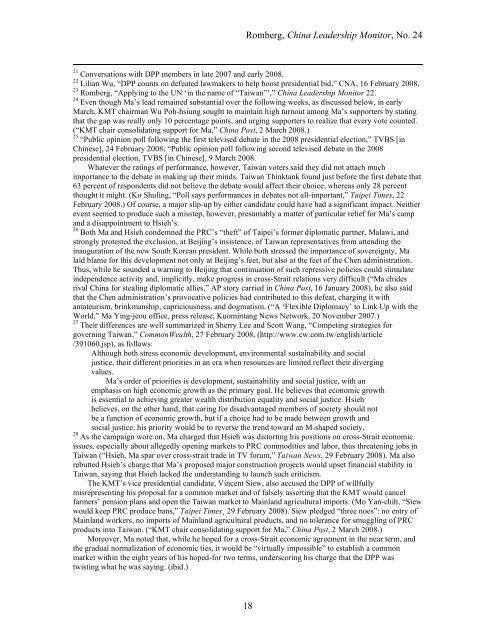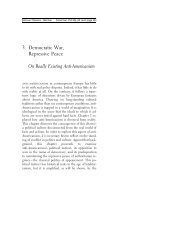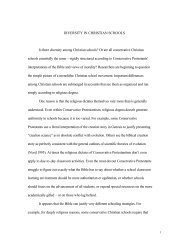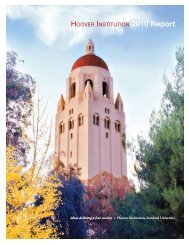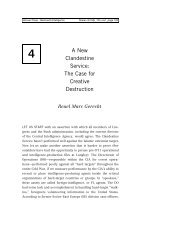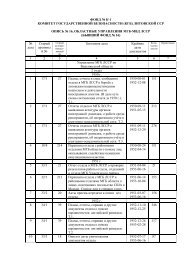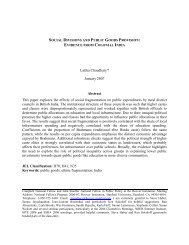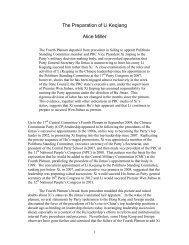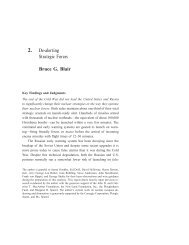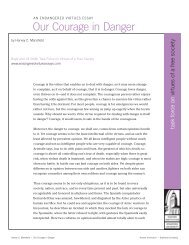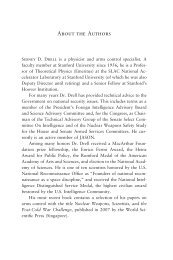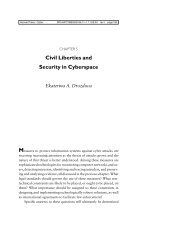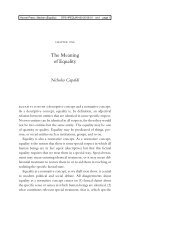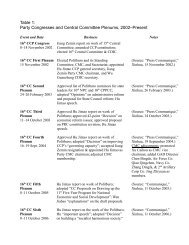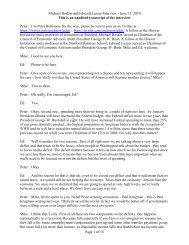Taiwan Elections: Foundation for the Future - Hoover Institution
Taiwan Elections: Foundation for the Future - Hoover Institution
Taiwan Elections: Foundation for the Future - Hoover Institution
You also want an ePaper? Increase the reach of your titles
YUMPU automatically turns print PDFs into web optimized ePapers that Google loves.
Romberg, China Leadership Monitor, No. 24<br />
21 Conversations with DPP members in late 2007 and early 2008.<br />
22 Lilian Wu, “DPP counts on defeated lawmakers to help boost presidential bid,” CNA, 16 February 2008.<br />
23 Romberg, “Applying to <strong>the</strong> UN ‘in <strong>the</strong> name of “<strong>Taiwan</strong>”’,” China Leadership Monitor 22.<br />
24 Even though Ma’s lead remained substantial over <strong>the</strong> following weeks, as discussed below, in early<br />
March, KMT chairman Wu Poh-hsiung sought to maintain high turnout among Ma’s supporters by stating<br />
that <strong>the</strong> gap was really only 10 percentage points, and urging supporters to realize that every vote counted.<br />
(“KMT chair consolidating support <strong>for</strong> Ma,” China Post, 2 March 2008.)<br />
25 “Public opinion poll following <strong>the</strong> first televised debate in <strong>the</strong> 2008 presidential election,” TVBS [in<br />
Chinese], 24 February 2008; “Public opinion poll following second televised debate in <strong>the</strong> 2008<br />
presidential election, TVBS [in Chinese], 9 March 2008.<br />
Whatever <strong>the</strong> ratings of per<strong>for</strong>mance, however, <strong>Taiwan</strong> voters said <strong>the</strong>y did not attach much<br />
importance to <strong>the</strong> debate in making up <strong>the</strong>ir minds. <strong>Taiwan</strong> Thinktank found just be<strong>for</strong>e <strong>the</strong> first debate that<br />
63 percent of respondents did not believe <strong>the</strong> debate would affect <strong>the</strong>ir choice, whereas only 28 percent<br />
thought it might. (Ko Shuling, “Poll says per<strong>for</strong>mances in debates not all-important,” Taipei Times, 22<br />
February 2008.) Of course, a major slip-up by ei<strong>the</strong>r candidate could have had a significant impact. Nei<strong>the</strong>r<br />
event seemed to produce such a misstep, however, presumably a matter of particular relief <strong>for</strong> Ma’s camp<br />
and a disappointment to Hsieh’s.<br />
26 Both Ma and Hsieh condemned <strong>the</strong> PRC’s “<strong>the</strong>ft” of Taipei’s <strong>for</strong>mer diplomatic partner, Malawi, and<br />
strongly protested <strong>the</strong> exclusion, at Beijing’s insistence, of <strong>Taiwan</strong> representatives from attending <strong>the</strong><br />
inauguration of <strong>the</strong> new South Korean president. While both stressed <strong>the</strong> importance of sovereignty, Ma<br />
laid blame <strong>for</strong> this development not only at Beijing’s feet, but also at <strong>the</strong> feet of <strong>the</strong> Chen administration.<br />
Thus, while he sounded a warning to Beijing that continuation of such repressive policies could stimulate<br />
independence activity and, implicitly, make progress in cross-Strait relations very difficult (“Ma chides<br />
rival China <strong>for</strong> stealing diplomatic allies,” AP story carried in China Post, 16 January 2008), he also said<br />
that <strong>the</strong> Chen administration’s provocative policies had contributed to this defeat, charging it with<br />
amateurism, brinkmanship, capriciousness, and dogmatism. (“A ‘Flexible Diplomacy’ to Link Up with <strong>the</strong><br />
World,” Ma Ying-jeou office, press release, Kuomintang News Network, 20 November 2007.)<br />
27 Their differences are well summarized in Sherry Lee and Scott Wang, “Competing strategies <strong>for</strong><br />
governing <strong>Taiwan</strong>,” CommonWealth, 27 February 2008, (http://www.cw.com.tw/english/article<br />
/391060.jsp), as follows:<br />
Although both stress economic development, environmental sustainability and social<br />
justice, <strong>the</strong>ir different priorities in an era when resources are limited reflect <strong>the</strong>ir diverging<br />
values.<br />
Ma’s order of priorities is development, sustainability and social justice, with an<br />
emphasis on high economic growth as <strong>the</strong> primary goal. He believes that economic growth<br />
is essential to achieving greater wealth distribution equality and social justice. Hsieh<br />
believes, on <strong>the</strong> o<strong>the</strong>r hand, that caring <strong>for</strong> disadvantaged members of society should not<br />
be a function of economic growth, but if a choice had to be made between growth and<br />
social justice, his priority would be to reverse <strong>the</strong> trend toward an M-shaped society.<br />
28 As <strong>the</strong> campaign wore on, Ma charged that Hsieh was distorting his positions on cross-Strait economic<br />
issues, especially about allegedly opening markets to PRC commodities and labor, thus threatening jobs in<br />
<strong>Taiwan</strong> (“Hsieh, Ma spar over cross-strait trade in TV <strong>for</strong>um,” <strong>Taiwan</strong> News, 29 February 2008). Ma also<br />
rebutted Hsieh’s charge that Ma’s proposed major construction projects would upset financial stability in<br />
<strong>Taiwan</strong>, saying that Hsieh lacked <strong>the</strong> understanding to launch such criticism.<br />
The KMT’s vice presidential candidate, Vincent Siew, also accused <strong>the</strong> DPP of willfully<br />
misrepresenting his proposal <strong>for</strong> a common market and of falsely asserting that <strong>the</strong> KMT would cancel<br />
farmers’ pension plans and open <strong>the</strong> <strong>Taiwan</strong> market to Mainland agricultural imports. (Mo Yan-chih, “Siew<br />
would keep PRC produce bans,” Taipei Times¸ 29 February 2008). Siew pledged “three noes”: no entry of<br />
Mainland workers, no imports of Mainland agricultural products, and no tolerance <strong>for</strong> smuggling of PRC<br />
products into <strong>Taiwan</strong>. (“KMT chair consolidating support <strong>for</strong> Ma,” China Post, 2 March 2008.)<br />
Moreover, Ma noted that, while he hoped <strong>for</strong> a cross-Strait economic agreement in <strong>the</strong> near term, and<br />
<strong>the</strong> gradual normalization of economic ties, it would be “virtually impossible” to establish a common<br />
market within <strong>the</strong> eight years of his hoped-<strong>for</strong> two terms, underscoring his charge that <strong>the</strong> DPP was<br />
twisting what he was saying. (ibid.)<br />
18


